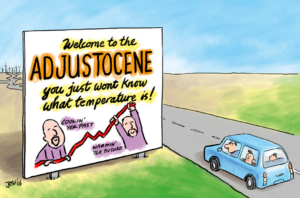Met Office Changed Global Temperature Record to Add 14% to Recent Warming, Says Climate Scientist

Satellite data show that global warming started to run out of steam two decades ago, but the U.K. Met Office’s record of surface temperature from 1975 was boosted by 14% at the end of 2020. At the same time, the period between 1880-1975 was cooled. The move accentuates the rise in the global temperature recorded in the 1980s and 1990s that forms the basis of much of the current hysteria about the so-called climate emergency.
The disclosure of the apparent warming and cooling is contained in the latest State of the Climate report from Emeritus Professor Ole Humlum of the University of Oslo, and published by the Global Warming Policy Foundation. Professor Humlum says the post-1975 warming is about +0.1°C and the pre-1975 cooling about -0.1°C. The version-change to the fifth HadCRUT Met Office database “conveys the impression of a somewhat more rapid global temperature increase following the relatively cold period terminating around 1975”. When the Met Office first announced the change in December 2020, it admitted to 0.16°C extra warming, although it didn’t give specifics about cooling and warming either side of the 1975 mark.
Professor Humlum also draws attention to significant retrospective changes in the American GISS surface temperature record. The graph below shows the effect of the changes made since May 2008 on the monthly temperature record, with increases in red and decreases in blue. As with HadCRUT, the changes warm the early part of the record, cool the period from 1900 to 1970, and heat up the later recordings.

Humlum notes that the changes in annual values are often quite substantial, ranging from about +0.15°C to −0.15°C. He goes on to note that the temperature difference between 1915 and 2000 increased from 0.45°C to 0.67°C. “This represents an increase of about 49% over this period, meaning that about half of the apparent global temperature increase from January 1910 to January 2000 is due to administrative adjustments to the original data made since May 2008,” he writes.
Recent boosts to global temperatures databases are of course very helpful to activists in the media and politics keen to report ‘record’ warm years at a time when accurate satellite data reveal a pause of 88 months (and counting). In addition, work continues across a number of fronts to promote the climate emergency agenda, including extreme weather events.
Last week, the BBC reported that southern African storms were fuelled by climate change. According to the BBC, the results of a study from the World Weather Attribution group show that damage inflicted by storms in the region was exacerbated by global warming. According to the press release, the group used “computer simulations” to arrive at its findings. The BBC ran the scare story, without a byline, despite noting that “the precise contribution of climate change to the event could not be quantified, due to the absence of comprehensive historical records of rainfall in the region”.
In fact, attributing single episodes of bad weather to long-term changes in the climate is highly unscientific, since it is just an opinion. In 2014, Associate Professor Jennifer Fitchett from the University of the Witwatersrand published a paper in which she said she found “no statistically significant trends in the frequency of tropical cyclone landfalls over Madagascar and Mozambique over the past six decades”. Furthermore, much of the perceived changes in storm numbers could be attributed to recent improvements in storm detection methods.
Professor Humlum’s excellent and measured climate report provides further context in which to evaluate the constant media scare stories about hurricane and cyclones.

The above graphs plot accumulated cyclone energy (ACE), as used by the U.S.-based National Oceanic and Atmospheric Administration (NOAA). Humlum notes that ACE gives a measure of the damage potential of an individual storm or a season. If climate change is affecting the southern hemisphere, and causing more severe problems in southern Africa, the trend does not yet appear to have shown up in the actual data. Overall, Humlum notes, “existing records do not suggest any abnormal cyclone activity in recent years”.
Another fashionable scare story is the loss of snow, particularly in the Alps, a favoured winter holiday destination of many Guardian, BBC and Extinction Rebellion supporters. In 2017, the Guardian reported that according to “experts” Alpine ski resorts could lose up to 70% of their snow cover by 2100. Last year, Justin Rowlatt reported on Panorama that snowy U.K. winters could become a thing of the past.

Back on Planet Reality, the thin blue lines above, show weekly northern hemisphere snow data, while the thicker blue line shows a 53 week average. There is practically no change going back 50 years
Humlum concluded: “A year ago, I warned that there was great risk in using computer modelling and immature science to make extraordinary claims. The empirical observations I have reviewed show very gentle warming and no evidence of a climate crisis.”
Chris Morrison is the Daily Sceptic’s Environment Editor
Click this link for the original source of this article.
Author: Weaver
This content is courtesy of, and owned and copyrighted by, https://tapnewswire.com and its author. This content is made available by use of the public RSS feed offered by the host site and is used for educational purposes only. If you are the author or represent the host site and would like this content removed now and in the future, please contact USSANews.com using the email address in the Contact page found in the website menu.
The post Met Office Changed Global Temperature Record to Add 14% to Recent Warming, Says Climate Scientist first appeared on USSA News. Visit USSANews.com.















